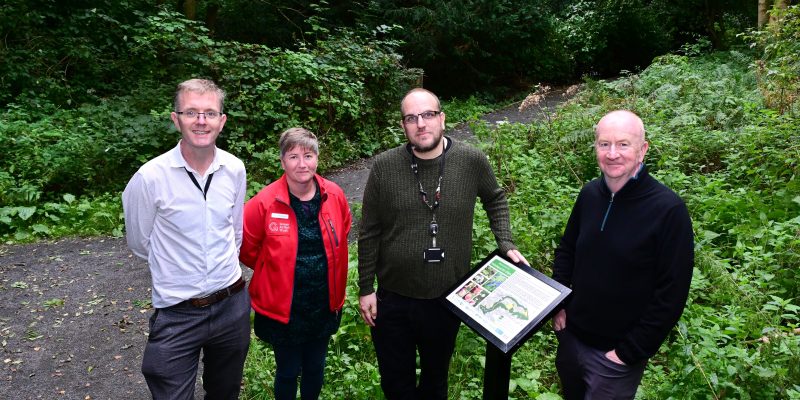Green Action Trust recently completed work on the Lower Braes Urban Woodlands Project, which has breathed new life into woodlands in and around Polmont, Westquarter and Redding.
The ambitious initiative got underway in 2021 and set out to enhance the resilience, amenity and conservation value of woodlands in the Lower Braes area with a significant £500k investment over three phases.
Falkirk Council has partnered with Green Action Trust over a number of years, to help them deliver their ongoing Greenspace and Woodlands Strategies. As part of the Lower Braes initiative, a range of interventions were delivered, including over 4 hectares of new tree planting, removal of invasive species, path upgrades and improvements to safety and accessibility for local communities.
The work is being carried out in three phases with the first two now phases now complete at seven sites.

Pictured (l-r): Danny Thallon, Falkirk Council; Nicola Duenas, Green Action Trust; Cllrs Deakin & Garner, Falkirk Council at Westquarter Glen
Councillor Paul Garner, spokesperson for Economic Development at Falkirk Council said: “The Lower Braes Urban Woodlands Project is a testament to the commitment of Falkirk Council and the Green Action Trust to preserve and enhance our native woodlands in Polmont, Westquarter and Redding.
“Woodlands are an essential part of our natural heritage offering recreational opportunities, enhancing biodiversity and contribute to the wellbeing of our communities. This project represents a significant investment in our local environment ensuring our woodlands are not only preserved for future generations but also made more accessible and enjoyable for everyone.”
Councillor Bryan Deakin, Falkirk’s spokesperson for Climate Change said: “Ongoing management and expansion of Council owned woodlands is an essential part of the Council’s journey to net zero. This project has created 4 hectares of new woodland which will help to sequester carbon dioxide as well as providing new habitat for wildlife.”
The Green Action Trust has been working with the Council over the last few years to manage and develop its woodland portfolio, thanks to funding from the Scottish Government’s Nature Restoration Fund, Scottish Forestry’s Woodland Improvement Grants and other sources.
Green Action Trust’s Operations Director, Emilie Wadsworth said: “We have been working in partnership with Falkirk Council to deliver their greenspace and woodland strategies for many years. Seeing these plans through to deliver real improvements on the ground is especially rewarding, for example at sites like Redding Bing, where now people can walk along a new path, straight from their homes and the playpark, into the outdoors and connect with other off-road routes through Polmont.
It’s great to see Falkirk Council’s ongoing commitment to improving their greenspaces for the benefit of communities, as well as to improving biodiversity and climate resilience. These efforts to regenerate our environment are crucial to achieving the wider vision of the Central Scotland Green Network.”
The final phase will start in 2024 and will focus on Polmont Woods with upgrading of paths, removal of invasive species, tree safety works and installation of interpretation signs. An overmature evergreen woodland on Station Road at the entrance to Gray Buchanan Park will also be felled, restocked with native trees and have a new path network installed.
The work completed at the seven sites so far includes:
- Polmont Park – removal of invasive species, removal of dying ash trees, planting of new native trees, creation of new paths to improve access and installation of welcome signs and new seating.
- Gray Buchanan Park – removal and height reduction of dangerous trees, planting of new native woodland, creation of new pathway links, resurfacing of existing woodland paths, and new welcome and interpretation signage.
- Westquarter Glen – tree thinning, removal of dangerous trees and old tree shelters, improvement of paths and steps leading to the burn, replacement of damaged fencing, and new welcome and interpretation signage.
- Westquarter South – removal of invasive, non-native rhododendron shrubs and pruning back vegetation from paths.
- Redding Bing – Planting of new native woodland, creation of new paths on existing narrow, informal routes, path resurfacing and new directional signage.
- Gilston Cresent greenspaces – Planting of new native woodland, path resurfacing and vegetation clearance.
- Laurieston Public Park – Planting of new native woodland
More information about phase 2 of the work, at six of the seven sites, can be found on the Polmont Woodlands page.
